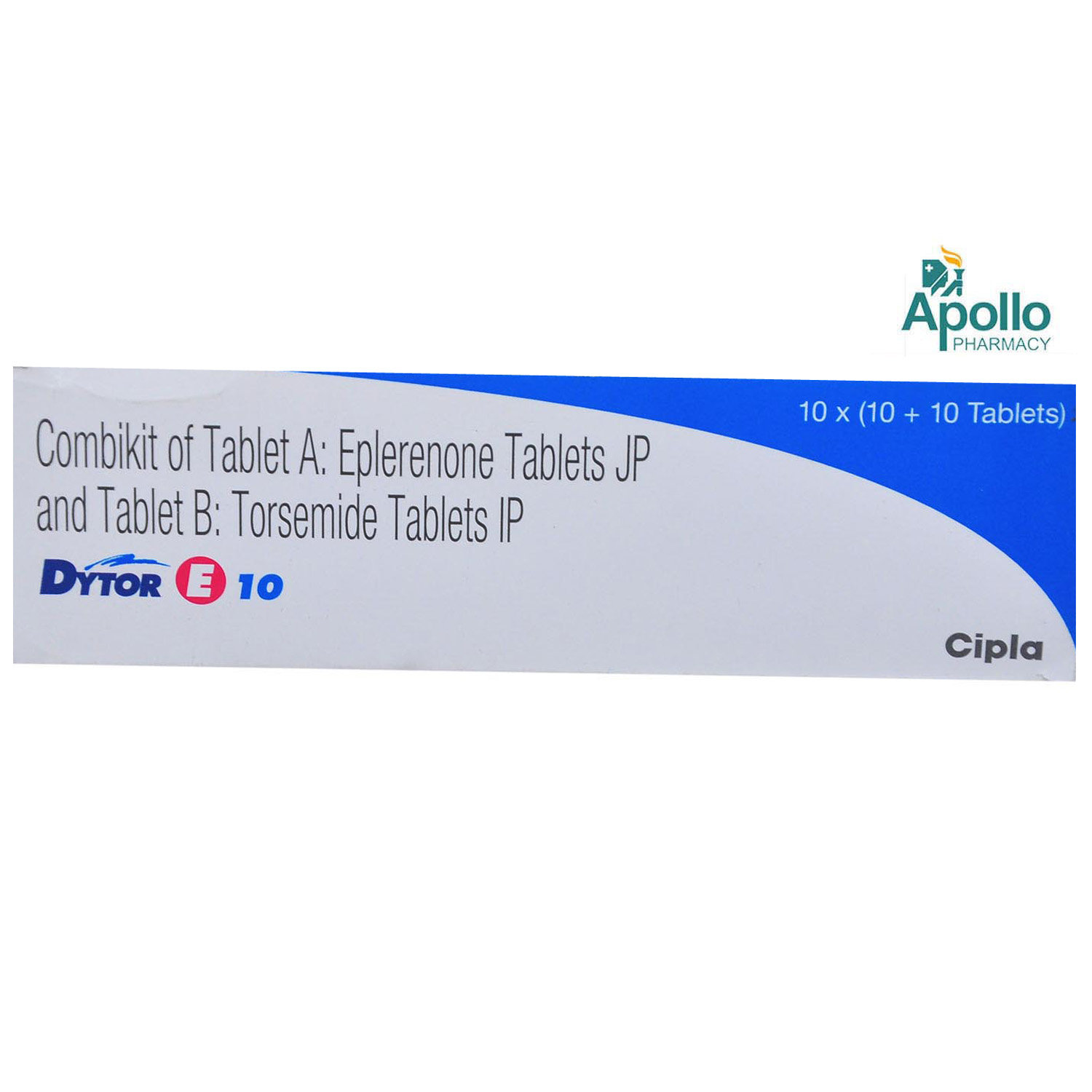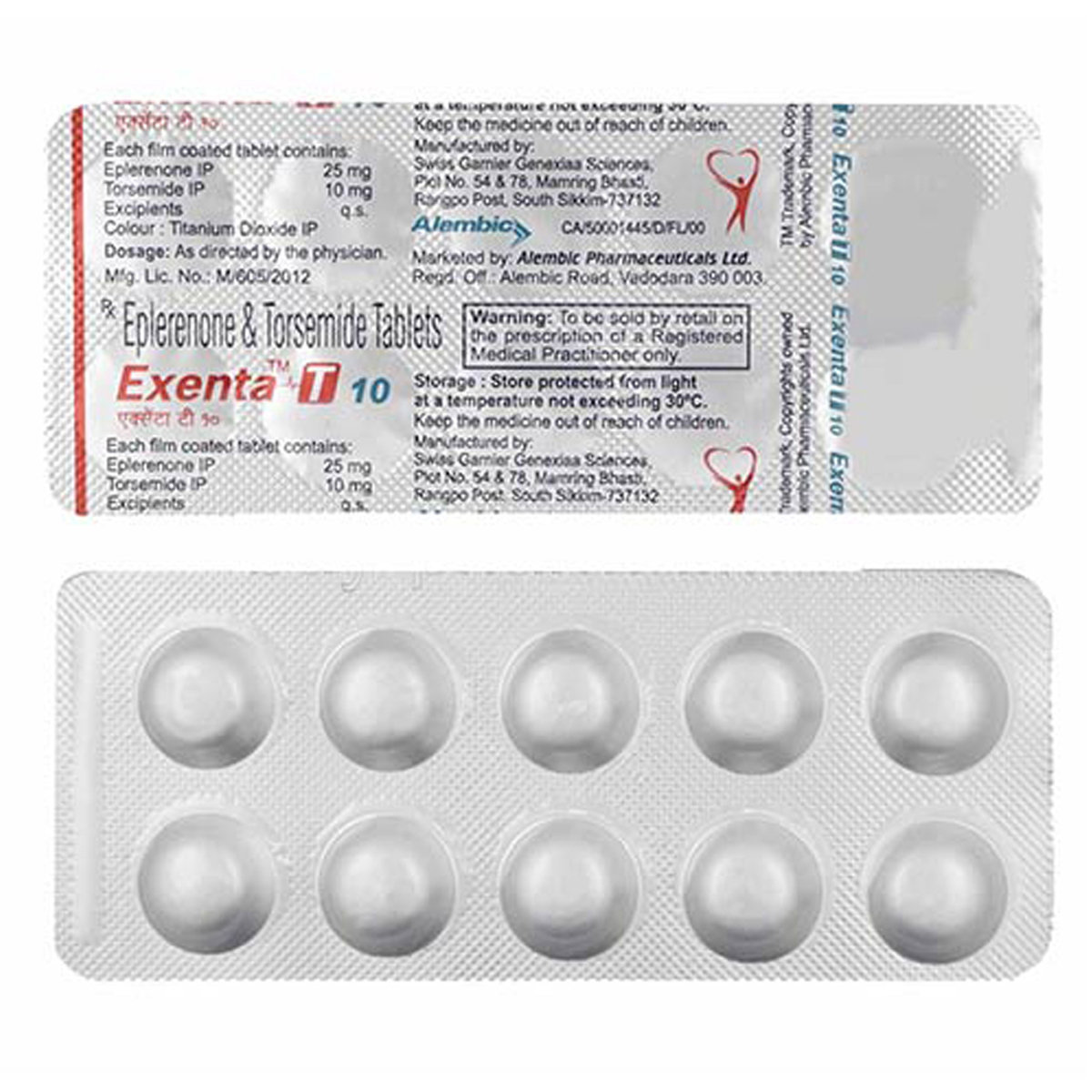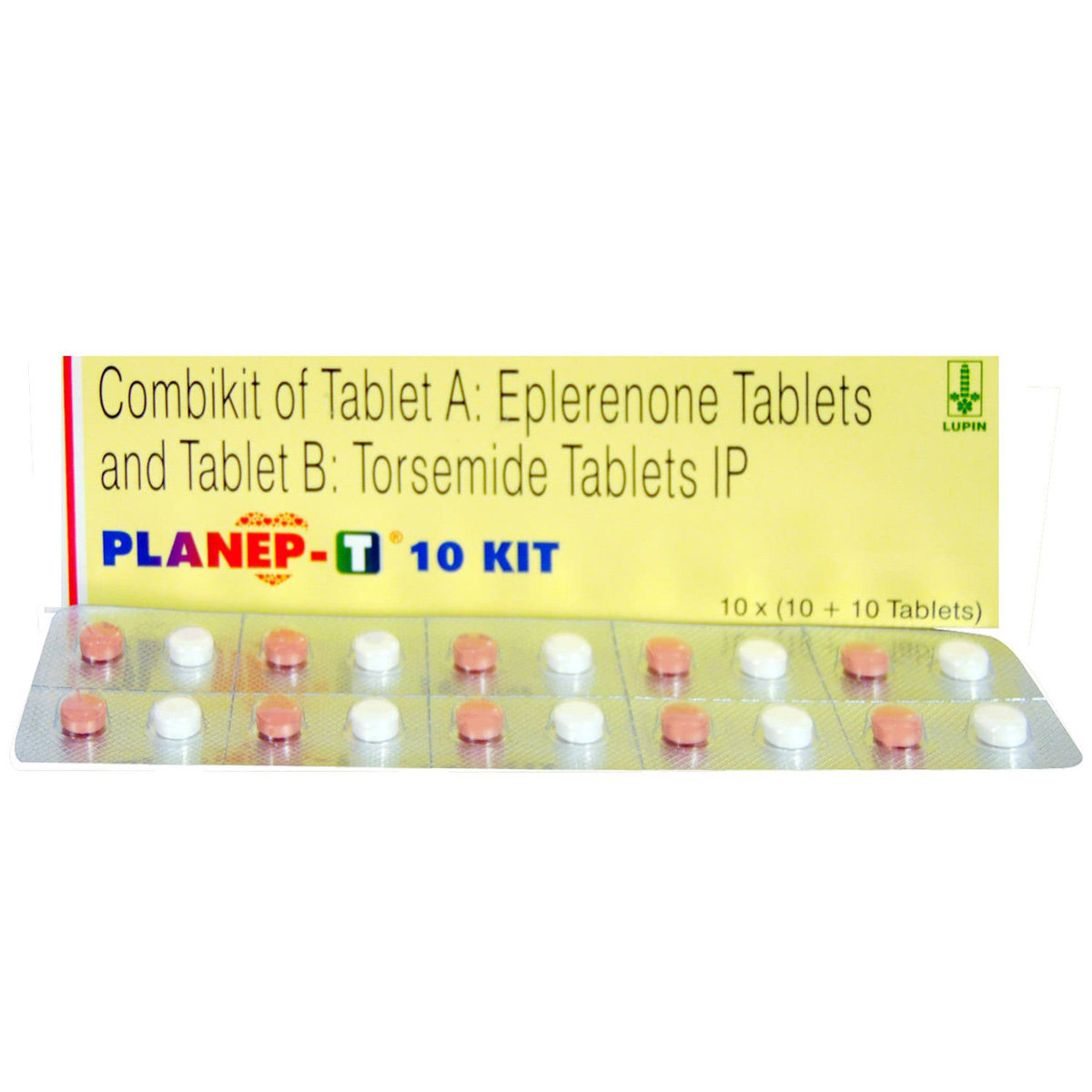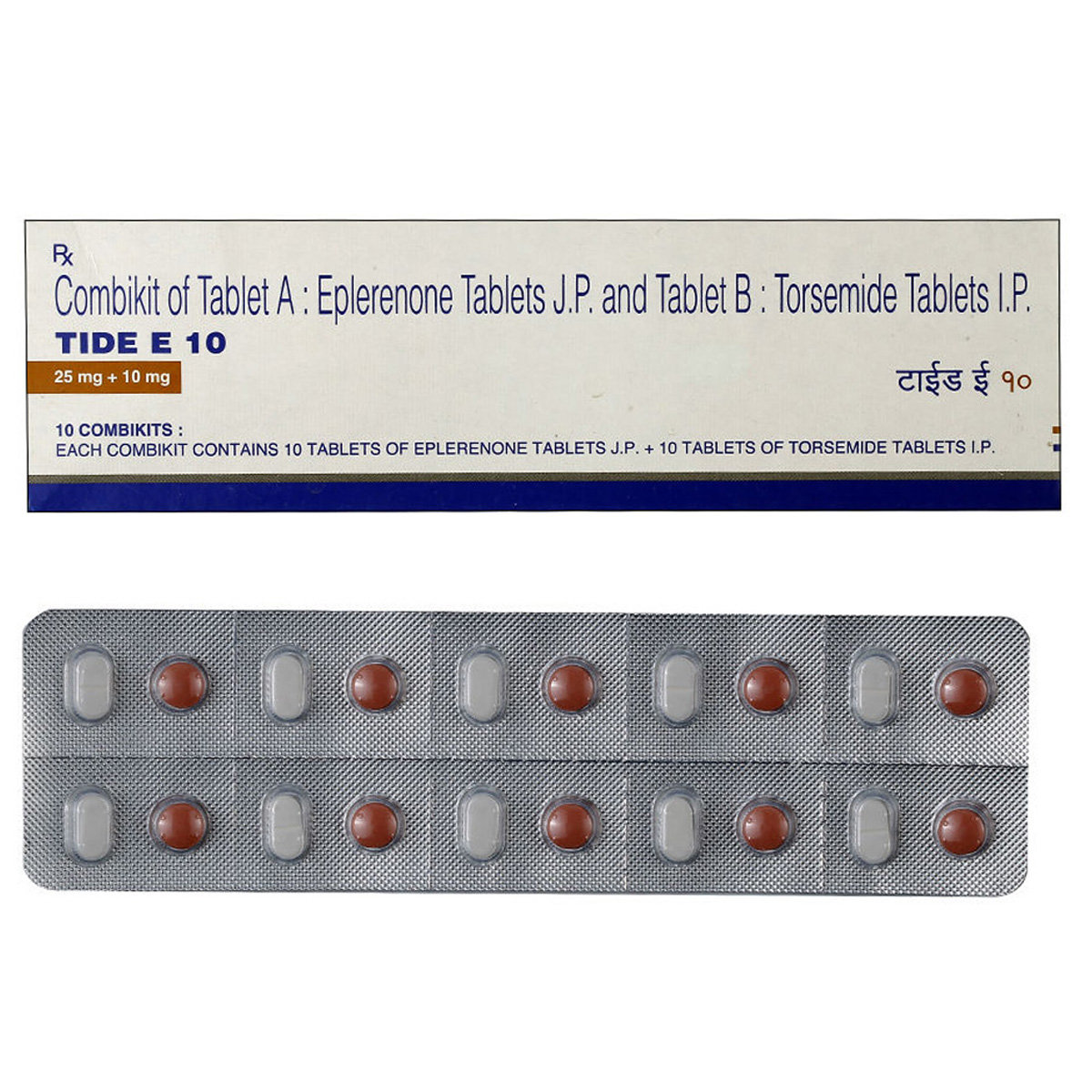- Home
- Eptus-T 10 Tablet
Eptus-T 10 Tablet Substitute
Eptus-T 10 Tablet Substitute
Medicine Composition:
EPLERENONE-25MG + TORASEMIDE-10MGAll Substitutes & Brand Comparisons
RX
Dytor Plus LS 20 Tablet 10's
Cipla Ltd
₹55
(₹4.95 per unit)
82% CHEAPERRX
Eplebless-T 10 Combikit 1's
Mankind Pharma Pvt Ltd
₹224.5
(₹11.23 per unit)
59% CHEAPERRX
Eplinora-T 10 Combipack Tablet 20's
BDR Pharmaceuticals Internationals Pvt Ltd
₹281
(₹14.05 per unit)
49% CHEAPERRX
Dytor E 10 Combi Kit 20's
Cipla Ltd
₹314
(₹14.13 per unit)
48% CHEAPERRX
Planep T 10 Kit (10+10 Tablet)
Lupin Ltd
₹345.5
(₹15.55 per unit)
43% CHEAPERRX
Exenta-T 10 Tablet 10's
Alembic Pharmaceuticals Ltd
₹307
(₹27.63 per unit)
RX
Planep-T 10 mg Kit Tablet 10's
Lupin Ltd
₹380
(₹34.2 per unit)
23% COSTLIERRX
Tide E 10 Combi Kit Tablet 1's
Torrent Pharmaceuticals Ltd
₹302.5
(₹272.3 per unit)
886% COSTLIER

When Should You Consider Switching from Eptus-T 10 Tablet ?
Patients may explore substitutes in the following scenarios:
- High monthly cost of Eptus-T 10 Tablet
- Non-availability in local pharmacies
- Generic recommendation by a doctor
- Side effects or better tolerability with alternatives
What to Know Before Switching
Before you switch from Eptus-T 10 Tablet to another medicine, here are some important points to keep in mind:
Same salt, different brands:
Most substitutes contain the same active ingredient - EPLERENONE-25MG + TORASEMIDE-10MG, but the fillers, coating, or manufacturing quality may vary slightly.
Consult your doctor first:
Even if the salt is the same, your doctor can confirm if the substitute is right for your condition, dosage, and health history.
Watch out for allergies or reactions:
Some people may react differently to certain brands due to inactive ingredients. If you notice any side effects, inform your doctor immediately.
Price ≠ effectiveness:
A lower-priced substitute doesn't mean it's less effective. Many generic medicines work just as well as branded ones.
Check the dosage form and strength:
Always match the substitute’s strength (e.g., 5mg, 10mg) and form (tablet, capsule, syrup) with what your doctor prescribed.
Uses
Eptus-T 10 Tablet is used to treat conditions involving fluid retention and high blood pressure. The detailed uses of Eptus-T 10 Tablet are as follows:
- Congestive Heart Failure Post-Myocardial Infarction: Eptus-T 10 Tablet helps improve the survival of stable patients with heart failure post-heart attack.
- Oedema: Eptus-T 10 Tablet reduces swelling and fluid buildup in patients with heart-related conditions.
- Hypertension: Eptus-T 10 Tablet lowers high blood pressure by reducing fluid retention, thereby reducing cardiovascular risk.
- Maintenance of potassium levels: Eptus-T 10 Tablet helps maintain normal potassium levels while promoting fluid loss.
Medicinal Benefits
- Eptus-T 10 Tablet helps improve survival in patients with congestive heart failure (CHF) following a myocardial infarction (heart attack).
- It aids in the management of hypertension (high blood pressure) by removing excess fluid and relaxing blood vessels.
- It reduces oedema (fluid retention) associated with heart failure, liver cirrhosis, or pulmonary hypertension.
- Eplerenone helps maintain normal potassium levels in the blood while controlling blood pressure.
- Torasemide promotes the removal of excess salt and water from the body, reducing swelling.
- It helps prevent fluid buildup in the lungs and tissues, improving breathing and comfort.
- Eptus-T 10 Tablet reduces strain on the heart, improving its overall function and efficiency.
- It enhances the quality of life and reduces complications related to fluid overload and high blood pressure.
FAQs
The substitutes of Eptus-T 10 Tablet contain the same active salt(s) - EPLERENONE-25MG + TORASEMIDE-10MG. However, they may differ in price, manufacturing quality, and inactive ingredients. Speak to your doctor to find a suitable option.
Switching to a generic substitute medicine in the place of Eptus-T 10 Tablet is often possible if it has the same salt, strength, and dosage form. But always check with your doctor before making any changes to your medication.
Generics versions of Eptus-T 10 Tablet are typically more affordable because they don’t include the original brand's research, development, and marketing costs. They contain the same active ingredient and are approved for safety and effectiveness.
Most people don’t notice any difference. However, some may react to different fillers or coatings. If you notice any unusual symptoms after switching, consult your doctor.
Make sure the new medicine has the same active salt, strength, dosage form. Always confirm the change with your doctor or pharmacist.
Substitutes of Eptus-T 10 Tablet meet the same safety and efficacy standards as Eptus-T 10 Tablet , but small differences in absorption or formulation can exist. A doctor can help you choose the right one for your needs.
Yes. Substitutes of Eptus-T 10 Tablet may vary in color, size, or shape due to differences in manufacturing and branding, but this does not affect how they work.
Yes, it’s generally safe to switch between multiple substitutes of Eptus-T 10 Tablet if they have the same salt and strength. However, always inform your doctor so they can monitor how your body responds.
Yes, many people safely use substitutes of Eptus-T 10 Tablet for long-term treatment. Just ensure it’s done under medical supervision.
If your symptoms stay under control or lab results remain stable, the substitute for Eptus-T 10 Tablet is likely working well. Regular follow-ups with your doctor are important.
Absolutely. Even with the same salt, small differences can affect how your body responds when switching from Eptus-T 10 Tablet to its substitute. Always consult your doctor before switching.
Eptus-T 10 Tablet is used to treat heart failure after a heart attack, high blood pressure, and oedema (fluid build-up).
Eptus-T 10 Tablet contains Eplerenone and Torasemide. Eplerenone blocks the hormone aldosterone, preventing fluid retention and maintaining potassium levels. Torasemide removes excess water and salt from the body, reducing swelling and fluid overload. Together, they improve heart function, reduce oedema, and help control blood pressure.
Yes, Eptus-T 10 Tablet may cause excessive urination. Most people need to pee about 30 minutes after taking Eptus-T 10 Tablet and again within a few hours. Do not take Eptus-T 10 Tablet before going to bed, or you may have to wake up at night to go for urination frequently.
Yes, Eptus-T 10 Tablet is known to cause dehydration (excessive fluid loss). The patient may experience dry mouth, decreased urine output, excessive thirst, and hypotension (decreased blood pressure). Please increase fluid intake to avoid severe dehydration.
Yes, Eptus-T 10 Tablet can cause increased potassium levels (hyperkalemia), especially in patients with kidney problems or when taken with potassium supplements. Please monitor your electrolyte level regularly to avoid increased blood potassium levels.
Yes, Eptus-T 10 Tablet may occasionally cause dizziness due to orthostatic hypotension (sudden drop in blood pressure when standing from a lying position) or passing out. To lower the chance of feeling dizzy or passing out, rise slowly if you have been sitting or lying down.
Swallow Eptus-T 10 Tablet whole with water; do not crush or chew it.
Eptus-T 10 Tablet should be taken with caution, only if prescribed by a doctor, and only if you have kidney or liver disease. Please consult the doctor if you have any concerns.
Eptus-T 10 Tablet may cause side effects like headache, dizziness, diarrhoea, constipation, nausea, and excessive urination. Most of these side effects do not require medical attention and resolve over time. However, consult your doctor if the side effects persist or worsen.
Treatment with Eptus-T 10 Tablet requires regular monitoring of serum potassium, sodium and creatinine levels. Monitor your blood pressure daily, and if there is excessive fluctuation, contact your doctor immediately. Regular monitoring of uric acid in patients with gouty arthritis.
Other medications can be taken with Eptus-T 10 Tablet only if advised by the doctor. Please consult the doctor before taking any other medicines with Eptus-T 10 Tablet to avoid interactions.
Buy best Cardiology products by
Torrent Pharmaceuticals Ltd
Sun Pharmaceutical Industries Ltd
Lupin Ltd
Intas Pharmaceuticals Ltd
Cipla Ltd
Micro Labs Ltd
Macleods Pharmaceuticals Ltd
Abbott India Ltd
Ajanta Pharma Ltd
Ipca Laboratories Ltd
Eris Life Sciences Ltd
Mankind Pharma Pvt Ltd
Lloyd Healthcare Pvt Ltd
Dr Reddy's Laboratories Ltd
Emcure Pharmaceuticals Ltd
Alembic Pharmaceuticals Ltd
Glenmark Pharmaceuticals Ltd
Alkem Laboratories Ltd
Zydus Healthcare Ltd
East West Pharma India Pvt Ltd
USV Pvt Ltd
Aristo Pharmaceuticals Pvt Ltd
Alteus Biogenics Pvt Ltd
J B Chemicals & Pharmaceuticals Ltd
Elbrit Life Sciences Pvt Ltd
Fusion Health Care Pvt Ltd
Eswar Therapeutics Pvt Ltd
La Renon Healthcare Pvt Ltd
Zydus Cadila
Akumentis Healthcare Ltd
Hbc Life Sciences Pvt Ltd
Troikaa Pharmaceuticals Ltd
Knoll Healthcare Pvt Ltd
Corona Remedies Pvt Ltd
Morepen Laboratories Ltd
Shrrishti Health Care Products Pvt Ltd
Prevego Healthcare & Research Pvt Ltd
Lividus Pharmaceuticals Pvt Ltd
Medley Pharmaceuticals Ltd
Cadila Pharmaceuticals Ltd
Jubilant Lifesciences Ltd
Msn Laboratories Pvt Ltd
Zuventus Healthcare Ltd
Steris Healthcare
Ranmarc Labs
Elder Pharmaceuticals Ltd
Tas Med India Pvt Ltd
Unison Pharmaceuticals Pvt Ltd
Primus Remedies Pvt Ltd
Leeford Healthcare Ltd
Blue Cross Laboratories Pvt Ltd
Azkka Pharmaceuticals Pvt Ltd
Sanofi India Ltd
Sinsan Pharmaceuticals Pvt Ltd
Nirvana India Pvt Ltd
Knoll Pharmaceuticals Ltd
Orsim Pharma
Systopic Laboratories Pvt Ltd
Indiabulls Pharmaceuticals Pvt Ltd
RPG Life Sciences Ltd
Biochem Pharmaceutical Industries Ltd
Johnlee Pharmaceuticals Pvt Ltd
Olcare Laboratories Pvt Ltd
Vasu Organics Pvt Ltd
Cadila Healthcare Ltd
Econ Healthcare
Shine Pharmaceuticals Ltd
Xemex Life Sciences
Elicad Pharmaceuticals Pvt Ltd
Elinor Pharmaceuticals (P) Ltd
Sunij Pharma Pvt Ltd
Orris Pharmaceuticals
Atos Lifesciences Pvt Ltd
FDC Ltd
Lia Life Sciences Pvt Ltd
Pfizer Ltd
MEDICAMEN BIOTECH LTD
Nicholas Piramal India Ltd
Astra Zeneca Pharma India Ltd
Lakshya Life Sciences Pvt Ltd
Opsis Care Lifesciences Pvt Ltd
Alvio Pharmaceuticals Pvt Ltd
Biocon Ltd
Finecure Pharmaceuticals Ltd
Glynis Pharmaceuticals Pvt Ltd
Indoco Remedies Ltd
Med Manor Organics Pvt Ltd
Acmedix Pharma Llp
Allysia Lifesciences Pvt Ltd
Chemo Healthcare Pvt Ltd
Pficus De Med Pvt Ltd
Proqol Health Care Pvt Ltd
Divine Savior Pvt Ltd
Enovus Healthcare Pvt Ltd
Ergos Life Sciences Pvt Ltd
Samarth Life Sciences Pvt Ltd
Signova Pharma
ALICAN PHARMACEUTICAL PVT LTD
Auspharma Pvt Ltd
Maxford Labs Pvt Ltd






